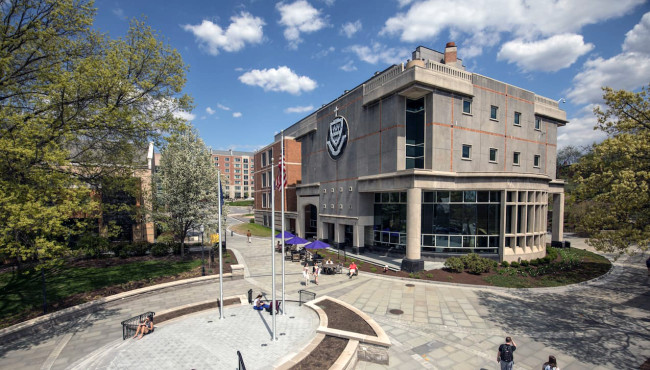University of Scranton hosts virtual Schemel Forum series on world affairs during spring semester

From a press release:
During the spring semester, the Schemel Forum’s World Affairs seminars at the University of Scranton will deliver a full spectrum of enlightening virtual presentations on current topics starting in February.
Eight experts in their fields will bring their insights into the homes of area residents, once again through a Zoom format due to health and safety restrictions caused by the pandemic. Open to the public, events will take place from noon-1:30 p.m., except the Feb. 3 seminar. Admission is $10 per seminar, and registered attendees will receive an emailed Zoom link prior to each talk.
“Nothing will replace the camaraderie of our World Affairs luncheon seminars and our six-session evening courses. That said, notwithstanding the limits thrust upon us by the pandemic, Schemel lives on! Thanks to the wonders of Zoom, we have had a semester rich in courses and speakers. We have continued to read and discuss texts, agree and disagree, continuing to enjoy the opportunity to learn together. True we have missed the live interaction that has stimulated and delighted us through the years – not to mention the big cookies – but we have adapted to our new (and hopefully temporary) constraints. We have proven our resilience and continuing appetite for learning,” Schemel Forum director Sondra Myers said.
“Given the circumstances, we begin our spring semester on Zoom. It may well be that we will continue Zoom all through to May. To be sure if we find that we have the opportunity to switch back to learning in person, we will seize it. If not, we will continue on this remote path throughout.”
Wednesday, Feb. 3: The series opens with “The Post-Pandemic World: Lessons from Asia,” presented by Parag Khanna, Ph.D., and managing partner of FutureMap Pte. Ltd. Likening the coronavirus pandemic to the 14th century Black Death, Dr. Khanna asserts that both have caused a profound worldwide loss of life, significant restructuring of trade patterns, major reordering of geopolitical relations, and substantial disruption to our daily lives. Khanna will map out expectations of the future of global capital flows, infrastructure investments, supply chains, industrial policies, accelerating growth sectors, and other major drivers of the new world order. This seminar will take place from 4 p.m.-5:30 p.m.
Wednesday, Feb. 17: Martha S. Jones, J.D., Ph.D., Society of Black Alumni Presidential Professor and professor of history at the SNF Agora Institute at Johns Hopkins University, will present “Vanguard: How Black Women Overcame Barriers, Won the Vote, and Insisted on Equality for All.” Dr. Jones said, “In the standard story, the suffrage crusade began in Seneca Falls in 1848 and ended with the ratification of the 19th Amendment in 1920. But this overwhelmingly white women’s movement did not win the vote for most black women. Securing their rights required a movement of their own.” Jones will discuss the history of African American women’s political lives in America, from the earliest days of the republic to the passage of the 1965 Voting Rights Act and beyond.
Tuesday, March 9: “Next Steps with Russia?” will be presented by Jill Dougherty, formerly CNN’s Moscow Bureau Chief for almost a decade and a frequent participant in the Schemel Forum seminar series. An expert on Russia, she is currently an adjunct professor at Georgetown University and a CNN on-air contributor. “The new U.S. administration faces a dangerously degraded relationship with Russia,” said Dougherty, who will analyze Russia’s challenge of redefining its relationship with America without a “reset.”
Tuesday, March 16: Carla McCabe, president and CEO of WVIA, the regional PBS/NPR affiliate, will present “America: The Farther Shore.” McCabe cited, “‘Believe that a farther shore is reachable from here.’ Those words of Nobel Laureate poet Seamus Heaney were my inspiration for coming to America. I grew up in Belfast, Northern Ireland, but here I am in Scranton, honored to lead WVIA. My aim is to ensure that we are embedded in the core of the communities we serve, producing programs that reflect who we are and, at the same time, open our hearts and minds to the world we live in.”
Wednesday, March 24: “Borges and Me: My Travels in the Highlands of Scotland with a Literary Genius” will be presented by Jay Parini, Axinn Professor of English at Middlebury College in Vermont. Parini, a native of Scranton and recipient of the University’s Distinguished Author Award in 2012, is a poet, novelist, and biographer. The author of 30 books, Parini’s “The Last Station” was made into an Academy Award-nominated film. His most recent book, “Borges and Me,” is a memoir of a young writer’s unexpected life-changing encounter with literary genius Jorge Luis Borges, an Argentine poet, essayist, and short story writer whose works became classics of 20th century literature.
Friday, April 9: Manisha Sinha, Ph.D., Draper Chair in American History at the University of Connecticut, will present “The Abolitionist International.” Dr. Sinha said, “My talk reimagines abolition as a radical international movement composed of ordinary men and women, whites and blacks. It shows how the fight to end slavery overlapped with contemporary social movements such as feminism, utopian socialism, and pacifism, as well as struggles for rights of labor, immigrants, and Native Americans.” Adam Pratt, associate professor of history at the University of Scranton, describes Dr. Sinha as a “first-rate scholar, whose work has forced historians to reconsider long-held ideas about how social and political change happened in the 19th century.”
Friday, April 16: “A Jesuit Education and Integrative Thinking in Biotechnology (Fighting Tuberculosis) and Economics (Eradicating Poverty)” will be presented by Michael Fairbanks, Ph.D., fellow at Harvard University and chairman and founder of Akagera Medicines, a Biotech company based in Boston and San Francisco focused on cures for infectious diseases. “The Scranton tradition of ‘scholarship and service’ is only part of the innovation story,” said Dr. Fairbanks. “Taking the best ideas and tools from one academic domain and applying them to the challenges of another is how real progress occurs.” Fairbanks has advised two-dozen presidents in Latin America, Africa, the Caribbean, and Eastern Europe on private sector development. Since 2001, he has been a senior advisor to President Paul Kagame of Rwanda, and his company, Akagera Medicines, is a public-private partnership between the people of Rwanda and scientists who are focused on solutions to infectious diseases.
The series will conclude on a to-be-determined date with “Consciousness: Life Transitions and the Importance of Story – Continued,” presented by Harmar Brereton, M.D. A former Scranton-area physician and one of the founders of the Schemel Forum, Dr. Brereton will follow up his fall semester seminar on life transitions with references to cave paintings, Homer, Sophocles, Jung, Tennyson, Shakespeare, and Erik Erikson.
The Schemel Forum was founded in July of 2006 through generous gifts to the Rev. George Schemel,
S.J., Fund, created by friends of the late Father Schemel in his loving memory. Its aim is to provide an opportunity for people of all ages to explore the intellectual and cultural wonders of the world. The World Affairs Seminar series is sponsored by Munley Law.
To register for the seminars, contact Schemel Forum assistant Alicen Morrison at 570-941-6206 or alicen.morrison@scranton.edu. For more information on Schemel Forum programs and memberships, contact Schemel Forum director Sondra Myers at 570-941-4089 or sondra.myers@scranton.edu.
As a private institution of nearly 4,000 undergraduates and more than 1,500 graduate students, the University of Scranton delivers a meaningful education that challenges its students morally, spiritually, and intellectually.
The 58-acre campus offers the best of both worlds – the city and the mountains. It is in the heart of the city of Scranton, in Pennsylvania’s Pocono Northeast, just two hours from New York City and Philadelphia. In recent years, the university invested more than $260 million in campus improvements, including new residence halls, a science center, and the state-of-the-art Leahy Hall, which houses the physical therapy, occupational therapy, and exercise science departments.
This university is more than a respected institution; it’s also a caring, nurturing community whose graduates are known for their devotion to the welfare of other human beings and by their special commitment to the pursuit of social justice.
Scranton develops leaders in every sense through rigorous preparation in students’ chosen fields, coupled with a commitment to educating the whole person in the liberal arts tradition. Students extend their academic experience through participation in honors programs, internships, faculty-student research, and study abroad, and the university provides excellent preparation for medical and other health professions doctoral programs, law school, graduate school, and post-graduate fellowships and scholarships.



